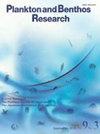The effects of photoperiod and temperature on embryonic diapause termination in the hermit crab Pagurus nigrofascia
IF 0.9
4区 生物学
Q4 MARINE & FRESHWATER BIOLOGY
引用次数: 1
Abstract
: The intertidal hermit crab Pagurus nigrofascia reproduces in March in Fukuoka, Japan. The embryos remain in diapause until October, begin to develop in November, and most broods hatch in December. This study examined the effects of photoperiod and temperature on embryonic diapause termination (EDT) in both laboratory and field condi -tions. Females with diapause eggs were maintained in the laboratory under three different photoperiod/temperature re -gimes: constant (14L/10D, 22° C), decreasing photoperiod condition (from 12L/12D to 9.8L/14.2D, 22 °C), and decreasing temperature condition (14L/10D, from 22 °C to 10° C). The EDT date was compared among four groups: the above three experimental groups and the field group. The dates at which > 50% of females possessed eggs after the EDT were November 10 (constant), October 30 (decreasing photoperiod), September 27 (decreasing temperature), and November 4 (field). The mean duration until EDT was 82 days (constant), 67 days (decreasing photoperiod), and 36 days (decreasing temperature). Diapause was significantly shorter under both the decreasing photoperiod and the decreasing temperature conditions compared to the constant. Thus, EDT was strongly affected by temperature but weakly altered by photope riod. This study is the first to report the influence of photoperiod and temperature on EDT in decapod crustaceans.光周期和温度对黑腹寄居蟹胚胎滞育终止的影响
:3月,日本福冈,潮间带寄居蟹Pagurus nigrofascia繁殖。胚胎在10月之前一直处于滞育状态,11月开始发育,大多数窝在12月孵化。本研究在实验室和野外条件下考察了光周期和温度对胚胎滞育终止(EDT)的影响。在实验室中,在三种不同的光周期/温度条件下维持滞育卵的雌性:恒定(14L/10D,22°C)、降低光周期条件(从12L/12D到9.8L/4.2D,22℃)和降低温度条件(14L/10D,从22°C到10°C)。比较了四组的EDT日期:上述三个实验组和现场组。EDT后50%以上的雌性产卵日期为11月10日(恒定)、10月30日(光周期减少)、9月27日(温度降低)和11月4日(现场)。直到EDT的平均持续时间为82天(恒定)、67天(光周期下降)和36天(温度下降)。与常数相比,在光周期减少和温度降低的条件下,滞育明显更短。因此,EDT受温度的强烈影响,但受光照时间的微弱影响。这项研究首次报道了光周期和温度对十足目甲壳类动物EDT的影响。
本文章由计算机程序翻译,如有差异,请以英文原文为准。
求助全文
约1分钟内获得全文
求助全文
来源期刊

Plankton & Benthos Research
Agricultural and Biological Sciences-Aquatic Science
CiteScore
1.30
自引率
0.00%
发文量
32
期刊介绍:
Plankton and Benthos Research is a peer-reviewed journal publishing quarterly original papers, reviews and notes dealing with any aspect of the biology and ecology of planktonic and benthic organisms and their interactions with the environment in any aquatic system, and is open to all scientists around the world. Submission of a paper is held to imply that it represents an original contribution not previously published and that it is not being considered elsewhere.
 求助内容:
求助内容: 应助结果提醒方式:
应助结果提醒方式:


